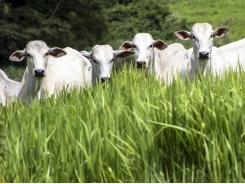Seaweed slashes methane production in first live study with cows

Scientists now have in vivo evidence that Asparagopsis seaweed can reduce methane emissions from dairy cows, providing further support for the use of this species as a feed additive.
In the study, inclusion of Asparagopsis armata in lactating dairy cows’ diet was shown to reduce enteric methane emissions by over 50% – an outcome that surprised even the researchers themselves.
“We knew that it was effective in vitro, but there are several additives that work in vitro, but not in vivo. So it was a bit of surprise to see that it was effective at such low levels,” co-author Ermias Kebreab, from the University of California’s Department of Animal Science, told FeedNavigator.
Many seaweeds have been demonstrated to reduce methane production but with variable effects on fermentative health and substrate digestibility. Only Asparagopsis seaweeds have been found to be effective at low inclusion levels in animal diets and without having negative impacts on rumen function.
Comparing seaweed species
“Asparagopsis taxiformis has the highest efficiency and Asparagopsis armata is about half as effective as taxiformis. There are some other species such as Dictyota that work but at much lower effectiveness,” noted Kebreab.
Prior to this latest study, all research demonstrating these effects in dairy cows had been conducted in the laboratory.
The seaweed tested in this study was reported to have antimethanogenic effect that reduces methane yield during in vitro fermentation by Kinley et al 2016, a finding that was then confirmed in vivo using sheep (Li et al., 2018), said the researchers.
In this study, 12 post-peak lactating Holstein cows were randomly assigned to three treatments (control, 0.5% and 1% inclusion levels of Asparagopsis armata) in a 3 × 3 Latin square design with three 21-day periods. Enteric methane emissions were measured using the GreenFeed system.
‘Highly significant results’
Methane production was found to have decreased by 26.4% at the low (0.5%) level of A. armata inclusion and 67.2% at the high (1%) level of inclusion.
The researchers also observed that feed intake was reduced by 10.8 and 38.0% respectively in cows fed the 0.5% and 1% seaweed inclusion.
There was no significant body weight change between cows receiving A. armata at low inclusion compared to control; however, cows receiving the 1% level gained 9.72 kg less than control cows. Kebreab suggested this drop in intake could mean that cows need more time to adjust to the new feed.
Feed conversion efficiency was greater in cows consuming A. armata at 0.5% and was significantly greater in cows fed diet with A. armata at 1% compared to the control group. However, cows fed the higher dose of A. armata produced 11.6% less milk compared to control cows and milk protein content decreased as A. armata inclusion increased.
“The implication of this study is that enteric methane emissions could potentially be halved by using seaweed as a feed additive to dairy cattle,” wrote the researchers, whilst acknowledging that “feed intake and milk yield were also reduced”.
Next steps
The researchers have already embarked on the next stage of their research: a longer term (six month) study measuring emissions from 21 beef steers and using another member of the Asparagopsis family: taxiformis.
“This will give us the confirmation firstly that it works. It will also tell us how long you can keep feeding them without reducing the effectiveness, as well as what the effect is on feed efficiency, animal health and meat quality and taste,” explained Kebreab.
Besides offering the potential to reduce methane emissions from livestock, seaweed is also being touted as a natural alternative to antibiotics for preventing digestive issues in cows. As to whether the Asparagopsis species has a role to play here, Kebreab said:
“Some seaweeds have been shown to promote better gut and immune health. We are collecting blood samples to analyze if this is the case.”
However, one hurdle to the commercial application of A. armata as a feed additive is the supply situation - there is currently no cultivation of Asparagopsis seaweed.
“Armata is not commercially available at the moment. But there is another research project going on to figure out how to scale up productivity at UC San Diego (Scripps Institute of Oceanography),” said Kebreab.
Source: Journal of Cleaner Production
Authors: BM Roque, JK Salwen, R Kinley, E Kebreab
Có thể bạn quan tâm
Phần mềm

Phối trộn thức ăn chăn nuôi

Pha dung dịch thủy canh

Định mức cho tôm ăn

Phối trộn phân bón NPK

Xác định tỷ lệ tôm sống

Chuyển đổi đơn vị phân bón

Xác định công suất sục khí

Chuyển đổi đơn vị tôm

Tính diện tích nhà kính

Tính thể tích ao hồ



 Canada: Cattle feed tools shed light on ingredient…
Canada: Cattle feed tools shed light on ingredient…  Supplemental sodium acetate may boost milk fat
Supplemental sodium acetate may boost milk fat